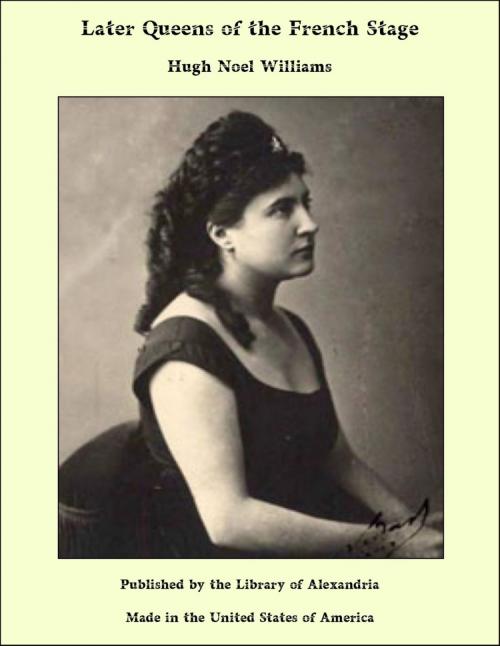Later Queens of the French Stage
Nonfiction, Religion & Spirituality, New Age, History, Fiction & Literature| Author: | Hugh Noel Williams | ISBN: | 9781465575333 |
| Publisher: | Library of Alexandria | Publication: | March 8, 2015 |
| Imprint: | Language: | English |
| Author: | Hugh Noel Williams |
| ISBN: | 9781465575333 |
| Publisher: | Library of Alexandria |
| Publication: | March 8, 2015 |
| Imprint: | |
| Language: | English |
IN her unpublished Mémoires, which she began, but never completed, and only a few pages of which—possibly all that she wrote—have been preserved, Sophie Arnould tells us that she was born in 1745, “in the same alcove in which Admiral Coligny had been assassinated two hundred years before.” As a matter of fact, the celebrated singer was born on February 14, 1745, and it was not until some years after her birth that her parents removed to the Hôtel de Ponthieu, Rue Béthisy, then known as the Rue des Fossés-Saint-Germain l’Auxerrois. Sophie’s parents belonged to the upper bourgeoisie, and at the time of her birth appear to have been in comfortable circumstances. Her father, Jean Arnould, was a worthy man, whose worldly ambitions were limited to securing a comfortable competence, retiring from business, and purchasing some Government or municipal office and the social distinction which went with it. Her mother, however, had received an excellent education, “which, joined to her natural intelligence,” says Sophie, “rendered her in society the most amiable and interesting of women.” She affected literary society and numbered among her friends and acquaintances Voltaire, Fontenelle, who, a few days before his death, called to show her the manuscript of one of the great Corneille’s tragedies, Piron, the Comte de Caylus, Moncrif, the Abbé (afterwards the Cardinal) de Bernis, Diderot, and d’Alembert. So impressed was Madame Arnould by the conversation of these celebrities, that she determined to make her little girl a prodigy of learning. Sophie’s education began almost as soon as she was out of her cradle. She was precocious and learned quickly. At four, she declares, she could read; at seven she wrote better than at the time of penning her Mémoires, and at the same age could read music at sight without any difficulty. The infant prodigy was petted and spoiled to the top of her bent, “dressed up in silk and satin, with marcasite necklace and flowers in her hair.” When the child was four or five years old she attracted the attention of the Princess of Modena, wife of the Prince de Conti, from whom, however, she was separated. Madame de Conti, lonely and bored, without husband, lover, child, or occupation, took a violent fancy to Sophie, and begged Madame Arnould to let her have the little girl to live with her. Madame Arnould consented, and Sophie became the plaything of the eccentric princess, “who dragged her about everywhere as she might have her little dog,” now nursing her on her knee, now setting her down to the harpsichord, now taking her visiting in her carriage, now summoning her to her salon to amuse her guests, and anon, if she happened to be in an ill-humour, turning her out into the ante-chamber to play with the yawning lackeys.
IN her unpublished Mémoires, which she began, but never completed, and only a few pages of which—possibly all that she wrote—have been preserved, Sophie Arnould tells us that she was born in 1745, “in the same alcove in which Admiral Coligny had been assassinated two hundred years before.” As a matter of fact, the celebrated singer was born on February 14, 1745, and it was not until some years after her birth that her parents removed to the Hôtel de Ponthieu, Rue Béthisy, then known as the Rue des Fossés-Saint-Germain l’Auxerrois. Sophie’s parents belonged to the upper bourgeoisie, and at the time of her birth appear to have been in comfortable circumstances. Her father, Jean Arnould, was a worthy man, whose worldly ambitions were limited to securing a comfortable competence, retiring from business, and purchasing some Government or municipal office and the social distinction which went with it. Her mother, however, had received an excellent education, “which, joined to her natural intelligence,” says Sophie, “rendered her in society the most amiable and interesting of women.” She affected literary society and numbered among her friends and acquaintances Voltaire, Fontenelle, who, a few days before his death, called to show her the manuscript of one of the great Corneille’s tragedies, Piron, the Comte de Caylus, Moncrif, the Abbé (afterwards the Cardinal) de Bernis, Diderot, and d’Alembert. So impressed was Madame Arnould by the conversation of these celebrities, that she determined to make her little girl a prodigy of learning. Sophie’s education began almost as soon as she was out of her cradle. She was precocious and learned quickly. At four, she declares, she could read; at seven she wrote better than at the time of penning her Mémoires, and at the same age could read music at sight without any difficulty. The infant prodigy was petted and spoiled to the top of her bent, “dressed up in silk and satin, with marcasite necklace and flowers in her hair.” When the child was four or five years old she attracted the attention of the Princess of Modena, wife of the Prince de Conti, from whom, however, she was separated. Madame de Conti, lonely and bored, without husband, lover, child, or occupation, took a violent fancy to Sophie, and begged Madame Arnould to let her have the little girl to live with her. Madame Arnould consented, and Sophie became the plaything of the eccentric princess, “who dragged her about everywhere as she might have her little dog,” now nursing her on her knee, now setting her down to the harpsichord, now taking her visiting in her carriage, now summoning her to her salon to amuse her guests, and anon, if she happened to be in an ill-humour, turning her out into the ante-chamber to play with the yawning lackeys.















